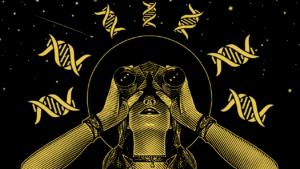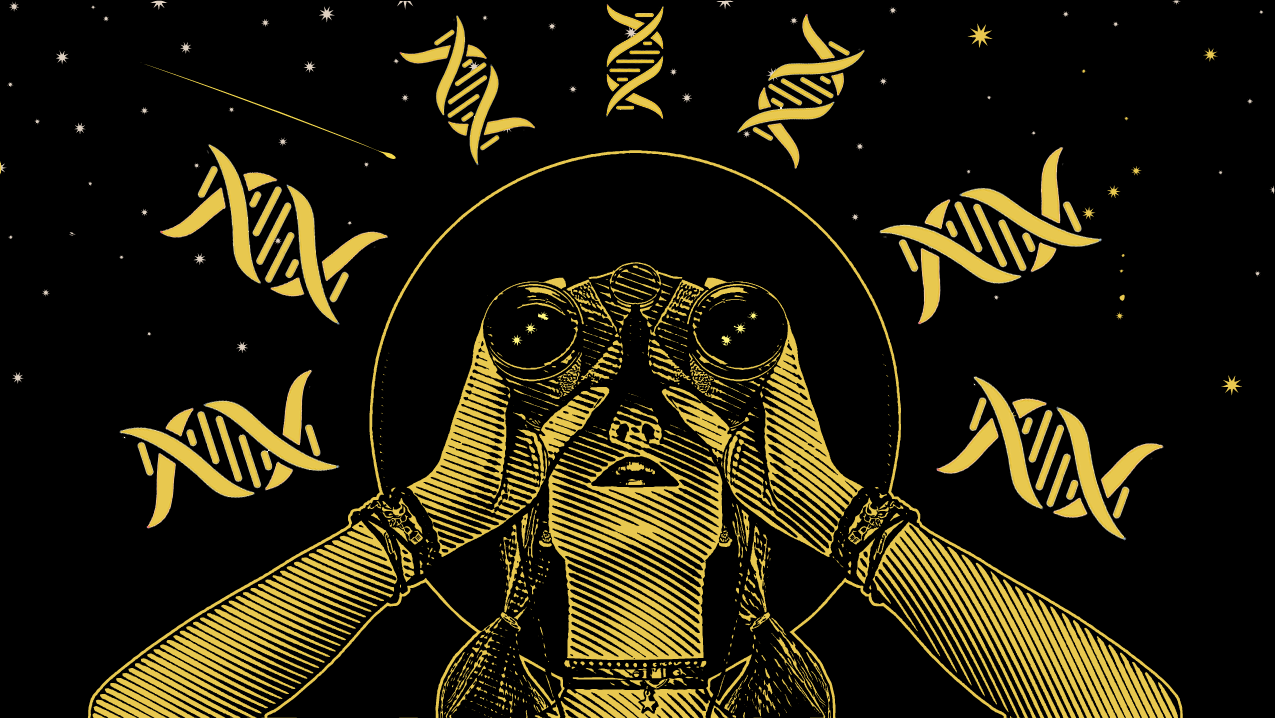 On Thursday, August 29, the DOE Joint Genome Institute hosted the latest installment of the Biosciences Area Entrepreneurship Program entitled, “Eyes on the Prize – Launching & Sustaining Startups in Synthetic Biology.”
On Thursday, August 29, the DOE Joint Genome Institute hosted the latest installment of the Biosciences Area Entrepreneurship Program entitled, “Eyes on the Prize – Launching & Sustaining Startups in Synthetic Biology.”
Some 40 attendees, drawing locally from JGI staff, as well as those shuttled in from Emery Station East, Potter Street, and the main Berkeley Lab campus, engaged with a panel organized by Robin Johnston and JGI Director Nigel Mouncey, who also moderated the discussion.
The panel included former NASA researcher-turned-industry community builder-empresario John Cumbers. In 2012, he established SynBioBeta – a leading community of innovators, investors, engineers, and thinkers who share a passion for using synthetic biology to build a better, more sustainable universe. His vision has conveyed SynBioBeta as the go-to gathering place, virtual and otherwise, for synthetic biology. Cumbers said those who frequently fail do so simply because they aren’t thinking big enough. In the ever-expanding sphere of SynBioBeta, which has added industry digests and podcasts to their signature annual summit hosted in San Francisco, it would be hard to accuse Cumbers of that.
Panelist Emily Leproust, CEO and Founder of Mission Bay-based Twist Bioscience advised the entrepreneurs in the audience to, “find a big market with unhappy customers.” As DNA sequencing costs plummeted, but such economies had yet to be achieved in the DNA synthesis market, she saw an opportunity to offer a service based on a novel high-throughput platform for high-quality synthetic DNA production at an affordable price. By way of encouragement, she said that none of her initial meetings with prospective investors resulted in money flowing. Nevertheless, she resolved, “I’m not hearing ‘no’, I’m hearing, ‘not yet’.” Her persistence and optimism have paid off with Twist’s market capitalization now north of $925 million. And Berkeley Lab is among Twist’s many customers.
When asked about her “do’s and don’ts,” she said the company’s success was a byproduct of the diversity of its workforce. She encouraged the attendees not to just hire people who look and think like themselves; instead, seek out those partners and employees with complementary strengths and weaknesses. “Diversity is just better for business,” she said. In considering how to support her team or prospective business partners, she turns to her catchphrase, “What can I do for you?” She also emphasized that early entrepreneurs shouldn’t worry about dilution or losing control of ownership. “I know my business better than anyone, so it’s just not a concern,” she said, adding, “I would rather have a small percentage of a big thing, than 100% of nothing.”
Third on the roster of entrepreneurs was former DOE Computational Science Graduate Fellowship alumna, Sarah Richardson, who went on to postdoctoral stints at both DOE Joint Genome Institute (JGI) and the Joint BioEnergy Institute (JBEI). Richardson, a 2017 Cyclotron Road fellow, is Founder and CEO of MicroByre, the company she launched to domesticate bacteria, particularly those not currently employed to manufacture biofuels, commodity chemicals, and antibiotics. Her advice for the crowd was not to take “dumb money,” implying that founders themselves need to do their due diligence regarding who they are pitching for money, as one would expect of those about to invest. “Uneducated investors tend to get panicky every time things don’t go just right and start to doubt the company.” A startup needs more than funding from investors – it needs staying power, good advice, and connections. Apparently MicroByre found some smart inventors;it had its official launch party in June, having just raised an initial round of outside funding.
Richardson passed the mic to Arvind Gupta, General Partner of SOSV, which has established such life sciences accelerator programs as the one he founded in IndieBio, the world’s largest biotech program-based seed fund. With literally hundreds of businesses launched in his portfolio, Gupta offered a cautionary tale about successful pitches. “We fund engineering, not science,” he said, suggesting that the role of government agencies such as the National Science Foundation, have traditionally assumed the role of supporting basic research while companies do not have that luxury. He also warned that giving too much equity to a passive founder who is not actively involved in the day-to-day operations or continuing to add value to the venture can lead to problems down the road when investors need to take shares. What is Gupta’s mantra? “Speed wins fights, patience wins wars,” he said. Somehow, knowing that besides being a seasoned venture capitalist Gupta is a world champion in No Gi Brazilian Jiu-Jitsu, gave his statement some additional weight.
All of the panelists recommended that anyone interested in starting a company conduct open-ended interviews with potential customers to determine their pain points or unmet needs, or better yet, participate in a customer discovery program, such as DOE’s Energy I-Corps or NSF I-Corps.
The mic circulated in response to a lively exchange of comments and questions in the room and for the panelists’ for closing statements. Never at a loss for ideas or words – his own or those of others who he routinely captures on his phone – Cumbers offered the proviso to not hold back from sharing ideas early and often. “Ideas evolve when you share them.”
Among the other home-grown entrepreneurs in the audience were Jill Fuss, another Cyclotron Road alum and founder of CinderBio, which harnesses microbes that inhabit extreme environments to produce ultra-stable enzymes. Also present was Christina Boville, a current member of Cyclotron Road Cohort Five and founder of Aralez Bio — which seeks to produce green enzymes for chemical manufacturing.
In addition to their roles in start-ups, booth Jill Fuss and Sarah Richardson serve as Biosciences Area entrepreneurship mentors. Other mentors joining them at the event were Nathan Hillson, Christina Ellwood (CEO of Tempathic and Cleantech Open advisor), and Tina Wang (Lab Operations Director, JBEI). By the end of the panel session, Arvind Gupta was enlisted as well.
Following the panel session, those who still had a hankering for networking reconvened down the block from JGI at Calicraft, in a nod to the ancient tradition of biotechnology, namely fermentation, and a time-tested product, beer.




